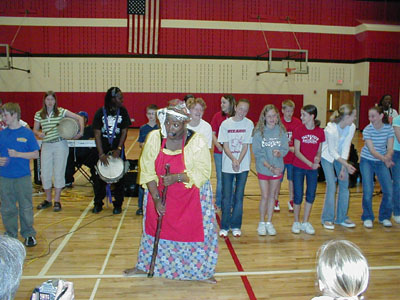By Janie Southard
jsouthard@dailystandard.com ST. HENRY -- Aunt Pearlie Sue and the Gullah Kinfolk breezed into the school gym Wednesday with drums, bells, and enormous energy that got middle school students singing, swaying and tapping toes. And finally everyone, including teachers, was in the act in a huge circle for the finale.

The language of Gullah is all about cadence and rhythm. As a culture, it's the history of generations of black Americans who came to the South Carolina barrier islands as slaves from West Africa more than 300 years ago.
Anita Singleton-Prather (aka Aunt Pearlie Sue), who lives on Ladies Island (one of the barrier chain), is on a five-week tour of 21 cities in Ohio, Illinois and Michigan along with her group the Gullah Kinfolk. The performers/historians/musicians have shared the Gullah story with PBS television audiences as well as students all over the United States.
"The slaves came from Angola (Africa), so ... Gola, Gullah? Could be, but that's only one of many theories about how Gullah came to be called Gullah," she told The Daily Standard before the performance at the St. Henry school gymnasium.
"There is V sound. It will be expressed B or W. And, the only pronoun is he. There isn't any she or it," she said. She went on to explain how the lilting and musical-sounding language was born.
"The slavers didn't take people from just one place in Africa. So the bellies of those ships were filled with people who spoke many different languages," she said. "The slavers liked that idea because that way the captives couldn't talk to each other and plan anything."
But the captured people later found their communication through a mixture of their various African languages. When they were sold onto island plantations in South Carolina, there were other nuances added.
"The masters were European and might have spoken English or German or French, for example. And, if they were sold from one plantation to another, well, there was another whole dialect to mix in," Singleton-Prather said before the performance.
Finally there was the language of the Native Americans who Singleton-Prather called the "original owners of the land" and elements of those tribal languages were stirred in the mix.
During the performance Singleton-Prather and the Kinfolk set this whole scenario to music in a rollicking history-lesson song called "Gullah Soup."
Standoffish at first, the audience quickly warmed to Aunt Pearlie Sue as she took them by the hand out of the bleachers exclaiming, "Honey, yo sho do look nice, this moanin'. Come on down heah."
The performances at St. Henry, Coldwater and Fort Recovery schools this week have been sponsored by Arts Midwest and Arts Place in Portland, Ind.
Singleton-Prather and the group will perform a public concert at 8 p.m. Saturday at Arts Place, 131 E. Walnut St., Portland, with a reception to follow.
For those interested in Gullah, the annual Gullah Festival in Beaufort, S.C., is scheduled for May 28 through May 31, according to Aunt Pearlie May. |

